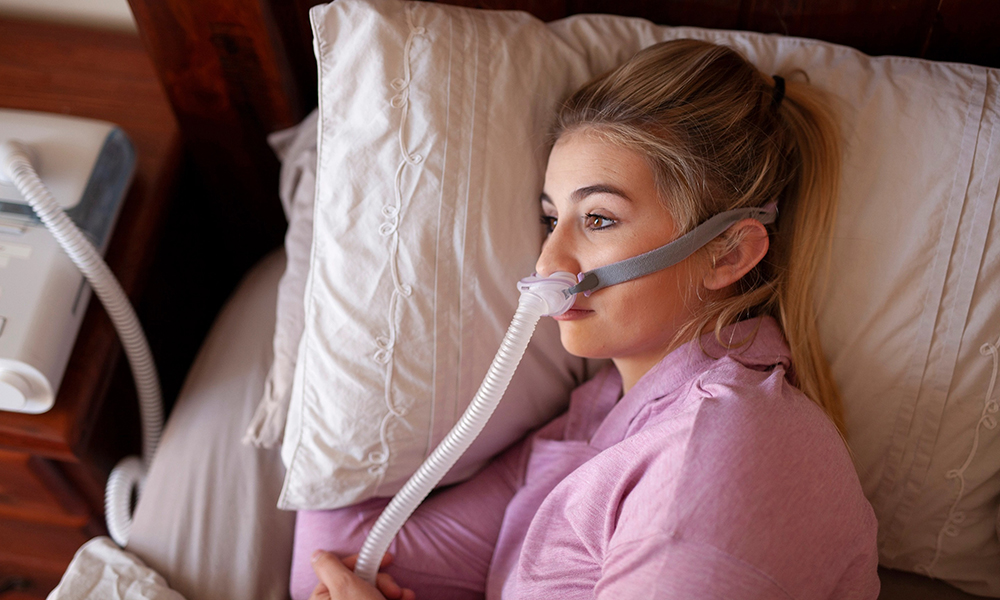
如果你在患新冠之前没有睡眠问题,感染之后你可能出现睡眠障碍,尤其是因为新冠住院治疗的患者。
这是《柳叶刀》(The Lancet)杂志发表的一篇最新研究论文的结论。研究发现,因新冠住院的患者普遍存在睡眠障碍。
来自英国的研究人员在疫情开始后的前两年内,调查了约2,500名住院治疗的新冠患者。他们发现,有62%的研究参与者出现了睡眠障碍,并且这种情况可能至少持续一年。一些患者需要在医院接受重症护理,但有些患者的病情并不严重。
这是首次有研究强调了睡眠障碍和气喘之间的联系。这两者都是较为常见的长新冠症状。研究人员表示,焦虑和肌肉功能衰退这两种与长新冠有关的症状,也可能是新冠后产生睡眠问题的原因。
因各种问题住院治疗的患者,普遍都会出现睡眠障碍。但研究人员发现,因新冠住院治疗的患者,平均睡眠时间比因其他原因住院的患者多65分钟,而睡眠效果和规律性更低。
研究人员表示,该项研究表明,睡眠障碍可能是长新冠的“重要驱动因素”,这意味着“对于因为新冠住院治疗的患者,可以针对睡眠质量不佳进行干预性治疗,用于管理共患病和恢复期,从而改善患者的治疗结果。”
加州大学圣地亚哥分校(University of California San Diego)的研究人员在对这篇论文的评论中指出,睡眠障碍“非常普遍”,全球约有10亿人受到阻塞性睡眠呼吸暂停的影响,约有10%的成年人深受失眠的困扰。
因此,他们写道,建议已出院的所有新冠患者筛查睡眠和呼吸问题,仍为时尚早。
哪些人感染新冠后出现睡眠问题的风险最高?
英国研究人员发现,在曾因新冠住院的患者中,存在下列特征的患者睡眠质量较差:
• 女性
• 比睡眠质量良好的患者更年轻
• 体重指数更高
• 此前曾被确诊患有抑郁症或焦虑症
• 此前存在呼吸困难
• 此前睡眠质量不佳
• 比睡眠质量良好的患者饮酒量更低
有下列特征的患者在感染新冠后睡眠质量最差:
• 吸烟者
• 先前被确诊患有以下任一疾病:
o 焦虑症
o 糖尿病
o 高血压
o 肾病
研究人员的发现与2015年一项更大范围研究的成果重叠。2015年的研究发现,有以下特征的老年人出现睡眠障碍的风险最高:
• 女性
• 有抑郁情绪
• 患有身体疾病
如何应对与新冠有关的睡眠障碍
德克萨斯大学休斯敦健康科学中心(UTHealth Houston)和纪念赫尔曼德州医疗中心(Memorial Hermann)的首席传染病和流行病学专家、德克萨斯大学休斯敦健康科学中心新冠卓越中心(COVID-19 Center of Excellence)的传染病主任刘易斯·奥斯特罗斯基博士对《财富》杂志表示,最新研究的结果“非常准确”。
奥斯特罗斯基表示:“我们经常听说有人在急性新冠期间做了稀奇古怪的梦,经常有人抱怨在康复后长期失眠,”无论人们是否因为新冠住院治疗。这可能是因为新冠病毒入侵了人体的中枢神经系统。
他表示,下列建议通常可以帮助患者应对在感染新冠后出现的睡眠障碍:
• 保持良好的睡眠卫生,包括固定睡觉时间,睡前逐步放松,睡前几个小时避免摄入咖啡因和其他刺激性物质
• 服用有助于入眠的非处方膳食补充剂褪黑素
• 与医生讨论治疗失眠的处方药
他表示,对于一些在新冠后出现睡眠问题的患者,基础治疗有很好的效果。这是好消息,因为对于新冠后睡眠障碍,目前没有特效疗法。
对于存在睡眠问题的患者,无论是否与新冠有关,他建议:咨询睡眠专家的意见,而不是订购可在家完成的在线睡眠研究。
他表示,睡眠专家“提供的服务”不只是睡眠研究。“睡眠质量不佳有许多原因。寻找睡眠专家是一笔很有价值的投资。”(财富中文网)
翻译:刘进龙
审校:汪皓
如果你在患新冠之前没有睡眠问题,感染之后你可能出现睡眠障碍,尤其是因为新冠住院治疗的患者。
这是《柳叶刀》(The Lancet)杂志发表的一篇最新研究论文的结论。研究发现,因新冠住院的患者普遍存在睡眠障碍。
来自英国的研究人员在疫情开始后的前两年内,调查了约2,500名住院治疗的新冠患者。他们发现,有62%的研究参与者出现了睡眠障碍,并且这种情况可能至少持续一年。一些患者需要在医院接受重症护理,但有些患者的病情并不严重。
这是首次有研究强调了睡眠障碍和气喘之间的联系。这两者都是较为常见的长新冠症状。研究人员表示,焦虑和肌肉功能衰退这两种与长新冠有关的症状,也可能是新冠后产生睡眠问题的原因。
因各种问题住院治疗的患者,普遍都会出现睡眠障碍。但研究人员发现,因新冠住院治疗的患者,平均睡眠时间比因其他原因住院的患者多65分钟,而睡眠效果和规律性更低。
研究人员表示,该项研究表明,睡眠障碍可能是长新冠的“重要驱动因素”,这意味着“对于因为新冠住院治疗的患者,可以针对睡眠质量不佳进行干预性治疗,用于管理共患病和恢复期,从而改善患者的治疗结果。”
加州大学圣地亚哥分校(University of California San Diego)的研究人员在对这篇论文的评论中指出,睡眠障碍“非常普遍”,全球约有10亿人受到阻塞性睡眠呼吸暂停的影响,约有10%的成年人深受失眠的困扰。
因此,他们写道,建议已出院的所有新冠患者筛查睡眠和呼吸问题,仍为时尚早。
哪些人感染新冠后出现睡眠问题的风险最高?
英国研究人员发现,在曾因新冠住院的患者中,存在下列特征的患者睡眠质量较差:
• 女性
• 比睡眠质量良好的患者更年轻
• 体重指数更高
• 此前曾被确诊患有抑郁症或焦虑症
• 此前存在呼吸困难
• 此前睡眠质量不佳
• 比睡眠质量良好的患者饮酒量更低
有下列特征的患者在感染新冠后睡眠质量最差:
• 吸烟者
• 先前被确诊患有以下任一疾病:
o 焦虑症
o 糖尿病
o 高血压
o 肾病
研究人员的发现与2015年一项更大范围研究的成果重叠。2015年的研究发现,有以下特征的老年人出现睡眠障碍的风险最高:
• 女性
• 有抑郁情绪
• 患有身体疾病
如何应对与新冠有关的睡眠障碍
德克萨斯大学休斯敦健康科学中心(UTHealth Houston)和纪念赫尔曼德州医疗中心(Memorial Hermann)的首席传染病和流行病学专家、德克萨斯大学休斯敦健康科学中心新冠卓越中心(COVID-19 Center of Excellence)的传染病主任刘易斯·奥斯特罗斯基博士对《财富》杂志表示,最新研究的结果“非常准确”。
奥斯特罗斯基表示:“我们经常听说有人在急性新冠期间做了稀奇古怪的梦,经常有人抱怨在康复后长期失眠,”无论人们是否因为新冠住院治疗。这可能是因为新冠病毒入侵了人体的中枢神经系统。
他表示,下列建议通常可以帮助患者应对在感染新冠后出现的睡眠障碍:
• 保持良好的睡眠卫生,包括固定睡觉时间,睡前逐步放松,睡前几个小时避免摄入咖啡因和其他刺激性物质
• 服用有助于入眠的非处方膳食补充剂褪黑素
• 与医生讨论治疗失眠的处方药
他表示,对于一些在新冠后出现睡眠问题的患者,基础治疗有很好的效果。这是好消息,因为对于新冠后睡眠障碍,目前没有特效疗法。
对于存在睡眠问题的患者,无论是否与新冠有关,他建议:咨询睡眠专家的意见,而不是订购可在家完成的在线睡眠研究。
他表示,睡眠专家“提供的服务”不只是睡眠研究。“睡眠质量不佳有许多原因。寻找睡眠专家是一笔很有价值的投资。”(财富中文网)
翻译:刘进龙
审校:汪皓
If you didn’t have sleep issues before COVID, you just might after—particularly if the virus hospitalized you.
That’s according to a new study published in The Lancet, which found that sleep disturbances were common among those who had been admitted because of the disease.
Such disturbances, found in 62% of study participants, were likely to last at least a year, the United Kingdom–based researchers noted after meeting with nearly 2,500 COVID patients hospitalized during the pandemic’s first two years. Some required critical care in the hospital, while others did not.
The study was the first to highlight the association between sleep disruption, a commonly reported symptom in long COVID, and breathlessness, another long COVID symptom. Anxiety and reduced muscle function also seemed to play a role in post-COVID sleep issues, and both have been linked to long COVID, the researchers noted.
Sleep disturbance is a common complaint among those who’ve been hospitalized for a variety of issues. Those who had been hospitalized with COVID, however, slept 65 minutes longer, on average, and saw lower sleep efficiency and regularity compared to patients who had been hospitalized for other causes, researchers found.
The study suggests that sleep disturbances could be an “important driver” of long COVID, the researchers assert, suggesting that “interventions targeting poor sleep quality could be used to manage multimorbidity and convalescence following hospital admission for COVID-19, with the aim of potentially improving patient outcomes.”
In a commentary on the piece, researchers at the University of California San Diego noted that sleep disorders are “exceedingly common,” with obstructive sleep apnea affecting an estimated 1 billion worldwide, and insomnia affecting roughly 10% of adults.
Thus, it’s too early to recommend that all COVID patients discharged from the hospital are screened for sleep and respiratory problems, they wrote.
Who’s most at risk for sleep issues after COVID?
Among those who had been hospitalized with COVID-19, those with the following qualities tended to suffer from poorer sleep quality, the U.K. researchers found:
• Women
• Younger than those who experienced good sleep
• Higher BMI
• Previous diagnosis of depression or anxiety
• Previous difficulty breathing
• Previous poor quality sleep
• Lower alcohol consumption than those who experienced good sleep
People with the following qualities tended to have the worst sleep following COVID:
• Smokers
• Those with a preexisting diagnosis of one of the following conditions:
o Anxiety
o Diabetes
o Hypertension
o Kidney disease
The researchers’ findings overlap with that of a broader 2015 study, which found that among older adults, the following types of people were most consistently at risk for sleep disturbances:
• Female
• Those with depressed mood
• Those with physical illness
How to cope with COVID-related sleep disturbances
The new research hits “right on the money,” Dr. Luis Ostrosky—chief of infectious diseases and epidemiology at UTHealth Houston and Memorial Hermann in Texas, and the infectious diseases director for UTHealth Houston’s COVID-19 Center of Excellence—tells Fortune.
“It’s not infrequent that we hear that people have weird dreams during the acute COVID phase, and people complain about insomnia long-term after,” whether they were hospitalized with the virus or not, Ostrosky says. That’s likely because COVID infiltrates the central nervous system.
The following options often help patients who are dealing with new-onset sleep disorders after COVID, he says:
• Developing good sleep hygiene, including setting a regular bedtime, winding down before bed, and avoiding caffeine and other stimulants several hours before bed
• Taking melatonin, a nonprescription supplement that helps many people fall asleep
• Discussing insomnia prescription medication with their doctor
For some with post-COVID sleep issues, basic treatments work exceedingly well, he says. That’s good news, given that there are no specific treatments for post-COVID sleep difficulties.
His advice to those who are struggling with sleep, whether or not they think there’s a COVID tie: Consult a sleep specialist, rather than ordering a sleep study online that can be completed at home.
Sleep specialists “have a lot to offer” beyond just sleep studies, he says. “There are many, many reasons people don’t sleep well. It’s a really good investment, and worth your while.”






